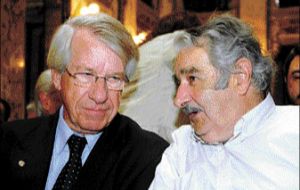MercoPress. South Atlantic News Agency
Rift in Uruguay's ruling coalition erodes Vazquez figure
 Senator Astori and Senator Mujica
Senator Astori and Senator Mujica Uruguay's ruling coalition in the midst of a bitter and at times confusing struggle to reach an agreement on its future presidential candidate for October 2009 elections is showing growing cracks of dissent and internal disorder.
The latest and most evident was the ruling coalition's majority insistence in approving a bill that decriminalizes abortion and which President Tabare Vazquez (doctor by profession and closely linked to the Catholic Church through the First Lady) had repeatedly warned he would veto on "biological and ethical" grounds. The ruling coalition members of Congress are now in a quagmire because they can either attempt to lift the veto, further debilitating the president's standing, or suffer a potential defeat since the opposition has anticipated it would uphold the veto. But that is not the only visible dissention. Senator, former Agriculture minister Jose Mujica, leader of the senior group in the ruling coalition is embarked on his own "foreign policy" brand which does not necessarily coincide with that of President Vazquez administration and also to say the least, generates confusion among allies and non allies. Mr. Mujica who as an unabashed presidential hopeful likes to boast he has the "charm and the votes" necessary to ensure a second term for the coalition, contrary to the "numbers and brains" of his main adversary, former Economy minister Danilo Astori, not only recently visited the Kirchner presidential couple in Buenos Aires but is now in a personal plea to Venezuela's Hugo Chavez for the sale of dairy produce and tyres. The excuse for his trip to neighbouring Argentina was to contact the almost 350.000 Uruguayans living mostly in Buenos Aires and who in the last election were decisive for the 0.9 percentage point that enabled an absolute majority victory for President Vazquez and the current coalition. But Mr. Mujica also met with the Kirchners, with whom Uruguay has a long standing international diplomatic conflict because of the Botnia pulp mill built on a joint managed river to which Argentina objects. Mr. Mujica not only had a picture taken with both Kirchners', the former Argentine president Nestor K refers to Mr. Vazquez as "that traitor" and Cristina Fernandez de Kirchner, but also promised to sign for a referendum on the lifting of a Uruguayan 20 year old amnesty bill that attempted to put a patch on the atrocities and excesses committed by the military regime (1973/1985) and the armed guerrilla movement of the late sixties, early seventies. President Vazquez has said all along that the "caducity prosecution bill" was confirmed by a referendum in 1989 and therefore he will not annul it. So had Mr. Mujica and his political group whose main leaders are former guerrillas. But apparently promises of more trade with Argentina and "some sort of civilized dialogue" with our neighbours "forced me to do what I have done", was the simple explanation. The rift between Mr. Vazquez and the Kichners has gone as far as vetoing the name of Nestor Kirchner for Secretary General of Unasur (Union of South American nations) and Argentina's non declared decision to withdraw from the joint decision to dredge River Place access channels which are crucial for several major projects along the Uruguayan coast, and threaten much needed billions of dollars in investments. In Venezuela Mujica tried to convince "companion" Chavez to purchase Uruguayan surplus dairy production (almost non existent in Caracas shelves) and car tyres from a rebuilt cooperative which on both cases have seen overseas sales cancelled because of world contraction. Chavez might be sensitive to Senator Mujica requests but he is also well aware that president Vazquez is not Socialist enough for his liking, is intent in reaching a trade agreement with the US "empire", hosted President George Bush in Montevideo and has avoided joint pictures with the Bolivarian revolution commandant fearing they could scare investors from Uruguay. Besides the Venezuelan oil for Uruguayan goods barter system, (involving millions of US dollars) allegedly is rampant with corruption claims, several requests of Congressional investigations and the backlash of the "suitcase" scandal in Argentina has strong proven ramifications in Uruguay, according to what was aired in the Miami federal court recently. Guess pragmatic Mr. Mujica next overseas visits, Bolivia, Ecuador, possibly Chile but no reply yet from Brazil's former union leader Lula da Silva.




Top Comments
Disclaimer & comment rulesCommenting for this story is now closed.
If you have a Facebook account, become a fan and comment on our Facebook Page!